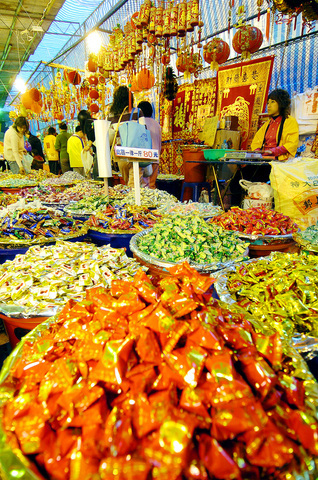Festivities for the Lunar New Year celebrations officially begin in Taipei today with the opening of Dihua Street (
Until Jan. 26 the street will be packed with stalls selling a wide variety of traditional New Year goods, continuing a tradition that goes back decades.
The area of the old city adjacent to Dihua Street, which includes Ningxia Road (

For those looking to try some interesting New Year foodstuffs there's salty dried fish, spicy beef jerky, wild boar sausages and a multitude of cavity-creating sugary candies to choose from.
One of the street's most enduring features is that the curious can eat their fill without actually purchasing anything.
The area is not only a Mecca for those looking for gifts and food, but it offers an all-too-rare glimpse of the Taipei of days gone by and while foodstuffs are high on the agenda of nearly everyone who visits the area, the vast array of edible substances are not the street's only attraction.
Performances of traditional folk arts and opera have also proven to be a great draw with locals and tourists alike in recent years. Along with performances by several of Taipei's leading classical Chinese opera troupes, shoppers will also be able to enjoy temple dancing, street magic shows and other forms of traditional entertainment.
If you do choose to take a trip back in time and enjoy the activities then do bare in mind the fact that large crowds attract criminal elements. While local police increase patrols and volunteers take to the streets to help curb theft at this busy outdoor market, at this time of year cases of purse snatching and pick-pocketing are common.

President William Lai (賴清德) yesterday delivered an address marking the first anniversary of his presidency. In the speech, Lai affirmed Taiwan’s global role in technology, trade and security. He announced economic and national security initiatives, and emphasized democratic values and cross-party cooperation. The following is the full text of his speech: Yesterday, outside of Beida Elementary School in New Taipei City’s Sanxia District (三峽), there was a major traffic accident that, sadly, claimed several lives and resulted in multiple injuries. The Executive Yuan immediately formed a task force, and last night I personally visited the victims in hospital. Central government agencies and the

Australia’s ABC last week published a piece on the recall campaign. The article emphasized the divisions in Taiwanese society and blamed the recall for worsening them. It quotes a supporter of the Taiwan People’s Party (TPP) as saying “I’m 43 years old, born and raised here, and I’ve never seen the country this divided in my entire life.” Apparently, as an adult, she slept through the post-election violence in 2000 and 2004 by the Chinese Nationalist Party (KMT), the veiled coup threats by the military when Chen Shui-bian (陳水扁) became president, the 2006 Red Shirt protests against him ginned up by

As with most of northern Thailand’s Chinese Nationalist Party (KMT) settlements, the village of Arunothai was only given a Thai name once the Thai government began in the 1970s to assert control over the border region and initiate a decades-long process of political integration. The village’s original name, bestowed by its Yunnanese founders when they first settled the valley in the late 1960s, was a Chinese name, Dagudi (大谷地), which literally translates as “a place for threshing rice.” At that time, these village founders did not know how permanent their settlement would be. Most of Arunothai’s first generation were soldiers

Among Thailand’s Chinese Nationalist Party (KMT) villages, a certain rivalry exists between Arunothai, the largest of these villages, and Mae Salong, which is currently the most prosperous. Historically, the rivalry stems from a split in KMT military factions in the early 1960s, which divided command and opium territories after Chiang Kai-shek (蔣介石) cut off open support in 1961 due to international pressure (see part two, “The KMT opium lords of the Golden Triangle,” on May 20). But today this rivalry manifests as a different kind of split, with Arunothai leading a pro-China faction and Mae Salong staunchly aligned to Taiwan.